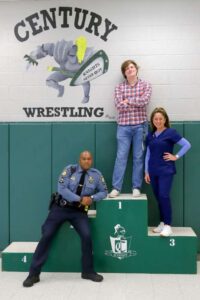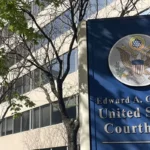Photographed above: Terry Wolfsheimer, Sgt. Shawn Kilgore and PFC Jason Kirkner
by Linda L. Esterson – photography by Nikola Tzenov
Heroes take many forms.
They are first responders, average citizens, or anyone who appears during a dangerous situation and strives to preserve life. More often than not, they are humble when it comes to their heroic efforts, explaining it away as part of the job, giving credit to others, or sometimes even crediting divine intervention.
In Carroll County, first responders commit to ensuring the safety and health of citizens every day. They apply their training and expertise to every incident, whether at work or off the clock. They might say their efforts are simply automatic. To everyone else, they are simply heroic.
In this year-end Heart of Carroll feature, we highlight three.
‘I’m Going To Do What I Can…’
After an enjoyable dinner with his son, daughter-in-law and two grandchildren, Raymond Cole invited his son, Ryan, to E.W. Beck’s in Sykesville for a beer.
They ordered, and that’s when Raymond began to feel light-headed. That’s all he remembers of that Thursday evening in late January. “Everything went black,” he says.

Ryan Cole recalls his father looking like he was having a seizure. His arms were drawn up and his breathing was labored. It became more and more shallow and he was unresponsive. Ryan yelled out for help and for someone to call 911.
Terry Wolfsheimer looked up and noticed Raymond’s body jerking. He heard Ryan screaming and rushed over from his table. With help, Wolfsheimer gently lowered Raymond to the floor so he could start chest compressions. The 911 operator asked if he was breathing, but Wolfsheimer could hear no air movement. He continued compressions for more than a minute. Raymond then took a deep breath and opened his eyes, seemingly in a deep sleep. Wolfsheimer continued the compressions.
By then, Sgt. Shawn Kilgore and PFC Jason Kirkner from the Sykesville Police Department arrived, Kilgore from the parking lot behind the restaurant and Kirkner from another call.
Each time an ambulance or fire truck is dispatched, Kilgore’s email sends him an alert. A few months ago, an email alerted him to a home engulfed in flames. Ever since, he’s watched his email closely. He saw the email for a cardiac patient at E.W. Beck’s.
“My first thought was, ‘You should probably go to that,’” recalls Kilgore, who started his 25th year on the force in August. “And my second thought was, ‘God I hope this is somebody that has indigestion, not somebody having a heart attack.’”
Kilgore ran to the restaurant’s entrance and took over for Wolfsheimer. He assessed the situation and began compressions, knowing that was Raymond’s best chance.
“You have to get CPR started as soon as you can in order to preserve oxygen in the brain,” he says. “We have to keep the brain alive and the only way you do that is with CPR, so I’m going to do what I can until somebody better gets there.”
After finding no pulse, Kilgore cut open Raymond’s shirt in preparation for the Automated External Defibrillator (AED). He noticed a scar, indicating a prior cardiac intervention. By then, Kirkner had grabbed the restaurant’s AED and followed the instructions to shock Raymond’s heart. After no rhythm was restored, Kilgore continued compressions.
Then he felt Raymond take a large breath, heard a sigh and felt a pulse. Within seconds, the paramedics arrived to take Raymond to the hospital. He was alert and talking during the transport and underwent surgery that evening to receive a pacemaker.
It was an unusual occurrence for the Coles to be out on a school night but Ryan’s wife’s hair appointment was cancelled and father and son took advantage of the opportunity. It was one that Ryan says saved his father’s life.
“It was one of those nights where everything fell exactly into place so that my dad survived,” Ryan says. “If we would have been here [at home] like we would have on another Thursday night, my dad wouldn’t have made it. And my kids would have had to watch.”
One paramedic who escorted Raymond to the hospital told Ryan that by starting CPR at the restaurant, Wolfsheimer had saved the man’s life.
“He said if that didn’t happen, if he would have waited, even as long as it took for the officers to get down the hill, probably would have been a different outcome,” Ryan says. “So he is a hero.” And he added that the officers are heroes, too. “They do this all the time every time just because it’s what they do.”
Kirkner scoffs at the title “hero.”
“It makes me uncomfortable a little bit; I like to be the guy in the background,” he says. “I will bust my butt. I will do my job. I will do it to the best of my abilities every day.”
Wolfsheimer hopes he never has to perform CPR on anyone again. It was emotionally and physically challenging, especially after losing his own father to a massive heart attack eight months earlier.
“I just wish that if my father would have been in a situation like this, someone would have helped him like I did,” he says. “This guy can have a couple more years with his son. … He gets to celebrate a couple more birthdays and grandkids’ birthdays.”
‘We’re Not Losing Him…’
It was just two days after the insurrection at the U.S. Capitol. The coronavirus remained a concern for the country. People everywhere were on edge. In an effort to move toward normalcy, Carroll County Public Schools opened its doors to students for the first time in nearly a year.

– Officer Demonte Harvey
Just before 8 a.m., Runk received a call that a student was having a seizure in the auxiliary gym, where Junior ROTC activities were underway. Knowing that none of the students had rescue medications for seizure disorders, she had no idea about the student’s identity.
Deputy Demonte Harvey, the school resource officer, joined Runk in a sprint to the gym. When they arrived, they found Jackson Reed lying on his left side, in a seizure recovery position, with his body jerking. His breathing was shallow, and his skin was turning blue, a sign of circulatory shutdown. Runk cleared his airway, and checked for a pulse. There was none.
Runk started CPR immediately and yelled out instructions to prepare the school’s AED. Harvey took over CPR while Runk placed the pads on the student’s chest. The AED barked instructions to administer the shock to the boy, and they did. The AED advised them to push harder and go faster, and Runk and Harvey continued, working to get his pulse and breathing to return. They kept going, nearly oblivious to the growing crowd that included fellow employees and school system leaders, members of the Sheriff’s Office, and Jackson’s parents.
After four rounds of CPR and three shocks with the AED, paramedics arrived. Runk expected to be relieved, but instead they instructed her to continue CPR while they inserted an IV to administer medications and an endotracheal tube to help him breathe.
Runk says it was exhausting and emotional. “Twelve minutes of CPR doesn’t sound like a lot, but boy, the adrenaline’s going,” she says. “And we were telling him not to give up, to hang in there, stay tough and stay strong.”
The pair continued CPR and defibrillation, while he was given medications and intubated. After an extended period, longer than 30 minutes, he was transported to Carroll Hospital.
The responders were determined to save Jackson. “I told Miss Runk, ‘We’re not losing him on this mat,’” said Officer Harvey. “If we [needed] to do CPR until midnight, we’re doing CPR until midnight.
“You don’t feel the exhaustion until after,” added Harvey, who was dealing with emotions of his own as his mother was undergoing surgery at the same time. “The adrenaline is flowing. You don’t feel tired, you don’t feel exhausted. You just keep going because you want this young man [to survive].”
Added Runk, a former intensive care nurse with 12 years of hospital experience, “I’ve done a lot of CPR in my life, but that’s controlled chaos with an IV team, doctors leading it and as many nurses as you can possibly need. There are drugs, there are resources. … But the feeling we had that morning [was that] we train for this, we’re prepared for this, never hoping to use it.”
The rescue went just as they practiced during training. The AED recorder showed that they performed CPR appropriately without a break in technique.
Jackson was flown by helicopter from Carroll to Johns Hopkins Hospital, where he received a defibrillator. He returned to school late in the spring and is now a senior preparing for the future. Runk shudders when she thinks about the what-ifs — if the board hadn’t voted to reopen school and Jackson was at home alone with his parents at work.
“Everything had to happen the way it did,” she said. “And he’s doing great!”
Jackson’s mother, Genell Reed, thanked Runk and Harvey for saving her son’s life.
“You are the perfect example of what a hero is. I know you probably think you were just doing your job, but the love and care of your actions changed us forever,” she wrote to Runk. “Jackson will live to graduate from a school he has always loved to, go to college, become a teacher, love and travel, and hopefully become a husband and father one day. And, we will get to experience and travel down these paths with him BECAUSE of you!”
Runk and Harvey were honored in April by Carroll County Public Schools for their lifesaving work.
‘Something’s Wrong…’
On September 30, 2021, a special ceremony at the Boy Scouts of America Troop 417 Court of Honor toasted 11-year-old Everett O’Hara, a former Cub Scout who remained calm when his neighbor’s yard was ablaze. Among his accolades were the Boy Scouts’s National Certificate of Merit, and a Certificate of Recognition and a Challenge Coin from the Carroll County Board of Commissioners.

Early one March afternoon, while playing outside, Everett noticed smoke coming from his neighbor’s yard, in a wooded area of Reisterstown in Carroll County. The neighbor was incinerating rotted limbs in a burn barrel, so Everett figured it was safe. But sometime later, when he looked again, Everett could see more smoke. He told his father, Steve O’Hara, that he was going to check on it.
“I saw extra smoke, like something was wrong,” he said. “I just can tell something’s wrong.”
He ran back to his house, and yelled to his father that there was a brush fire in a wooded area between their homes and asked his mom to call 911. Steve ran to retrieve two 2.5-gallon water fire extinguishers, carrying one while Everett and his older sister, Rebekah, an active Girl Scout, carried the other. They rushed to their neighbor’s yard and found the flames as high as Everett’s waist — about four feet.
“Our whole neighborhood’s pretty much a forest, full of foliage with a lot of dry leaves, and it hadn’t rained for a while,” Everett said. “There was a possibility their house might have caught on fire or a forest fire might happen if I didn’t notice in time before it got really bad.”

In the 20 to 25 minutes before the arrival of a crew from the Reese & Community Volunteer Fire Company, the O’Haras extinguished the perimeter of the blaze, which Steve estimates was just 20 feet from the neighbor’s log house. This prevented the fire from spreading further into the woods. Everett kept watch for the firetruck to flag them down, and after they arrived and began dousing the smoldering remains, Everett assisted by helping to hold the water hose.
In his official written statement to the Boy Scouts, Everett wrote about learning to remain calm in an emergency, going back to his time as a Tiger in Cub Scouts. He learned about fire and emergencies while meeting his AOL (Arrow of Light) outdoor adventurer requirement. His den had also reviewed the importance of remaining calm while working on his emergency preparedness award as an AOL Scout.
“Scouts has taught me to stay calm so I can handle emergencies like this one,” he wrote.
Reese Fire Company Capt. Andrew Leeds praised Everett’s heroism in his written statement. “Given the dry conditions at the time and the distance involved in the response, Everett’s action in informing adults who could safely use extinguishers and garden hoses to manage the fire until the arrival of company personnel and equipment likely prevented a much larger incident which could have threatened nearby homes.”

Steve, who along with Rebekah received a Baltimore Area Council Boy Scouts of America Certificate of Merit, expressed his pride in his son. “It’s one thing to teach how to handle emergency response situations, but it’s different when someone’s in that situation to see them keep their calm, not get anxious and have a level head. I was very proud to see that.”
Even more noteworthy is that Everett was diagnosed with high-functioning autism and anxiety, Steve said. “To have that calmness in the situation — that was one of the things that was [the most] inspiring of all. After he reported it, I was next on the scene. And from my perspective, the whole perimeter was four-foot-high flames. It was intimidating.”
The incident did take a toll on the youngster, however. During the incident, he suddenly had difficulty breathing because of the smoke.
“I had an asthma attack while working, but I had to push through it,” he said.
While the firefighters wrapped up, Everett fell asleep on the driveway. Steve administered his rescue inhaler and took him home.
“It was hard for me to sleep that night. I kept coughing a lot,” he reflected on the event that occurred in March 2020. “But I felt great being able to help my neighbor in an emergency!”













